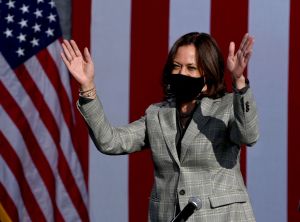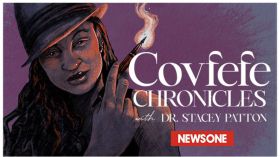As Pence-Harris Debate Looms, So Does Uncertainty

Source: Ethan Miller / Getty
UPDATE: With the debate upon us, details of how the event will play out, and all safety measures put in place have been revealed to the public. Especially notable has been the back and forth chatter between Pence and Harris’ teams regarding what social distance guidelines will be followed.
Initially, Pence’s side did not want any sort of barrier between the two speakers in tonight’s debate despite the growing concern of the spread of COVID-19 among White House officials, including President Trump. With the Commission on Presidential Debates cleared to erect a clear plexiglass banner between Pence and Harris, it was the first step in protecting the health and safety of the opposing debaters.
As has been widely reported, Pence appeared at the Rose Garden event at the White House with several attendees coming down with a positive coronavirus diagnosis and has been seen as ground zero of the spread ravaging the administration.
The speakers will sit 12 feet apart according to guidelines, and a curved plexiglass barrier will be placed in front of them. Images of crews placing the barriers in position on the debate stage made their way online and it was also learned that the Commission was prepared to allow Pence to speak without a barrier while Harris insisted on the protective measure.
Viewers tonight can expect Harris to come down hard on Pence and the Trump administration’s handling of the coronavirus epidemic and the lack of positive response to the racial unrest that is still prevalent despite the shift in news coverage. There are also expectations this debate will not drift into turbulent waters much like Trump and Biden’s affairs due to Pence’s calmer temperament and Harris’ skills as a former prosecutor.
Both will no doubt come immediately prepared as this is a high stakes moment for both the Trump and Biden campaigns.
Read below to see NewsOne’s earlier coverage of the debate.
With the first presidential debate officially in the books with plans going forward yet to be determined, the vice presidential debate will soon be underway. However, given President Donald Trump’s recent brush with the coronavirus, uncertainty looms ahead for Vice President Mike Pence and Sen. Kamala Harris‘ verbal square off.
Shortly after the conclusion of the debate between Trump and former Vice President Joe Biden last week, the messy affair did little to sway undecided voters or either side of the aisle according to most published accounts. Yet it was largely surmised that Biden got the better of the debate, although he frequently caved to Trump’s bluster and bullying instead of taking a higher road.
In normal election cycles, the vice presidential debates are fine fare for political wonks but usually not for the general public. As highlighted in a New York Times report, the stakes for the impending Wednesday (Oct. 7) debate in Utah between Pence and Harris could have a potential impact in the coming weeks while Democrats and Republicans scramble to provide solid messaging on policy and respective party ideals.
Harris has the chops for the debate stage, demonstrating so across 11 debates between potential Democratic Party nominees vying for the White House beginning last year. Some might remember that a 12th debate was scheduled as nominees dwindled just as the coronavirus pandemic began to take hold nationwide this past spring.
It could also be assumed that given the health risks of holding a debate in closed quarters will remain front and center ahead of the debate while analysts and reporters continue to analyze the timing of Trump’s coronavirus diagnosis and if he was indeed infected during last week’s debate with Biden.
With 210,000 deaths recorded thus far due to COVID-19 complications, the debate stage could also be a determining factor on how the Biden-Harris ticket can leverage the discussion and promote policies aimed to address the pandemic for all Americans.
Airing across a variety of mediums, the vice presidential debate will go for 90 minutes and will be broken into nine 10-minute segments with USA Today’s Washington bureau chief Susan Page serving as the moderator. The pair will be sat at a distance of 12 feet apart, and the discussion will include the pandemic, economic recovery efforts, the balance of the Supreme Court, and race relations among other topics.
The vice presidential debate takes place on Wednesday, Oct. 7, and will air live from the University of Utah in Salt Lake City beginning at 9:00 p.n. ET, 6:00 p.m. PT.
More information can be found here.
—
Photo: Getty


















